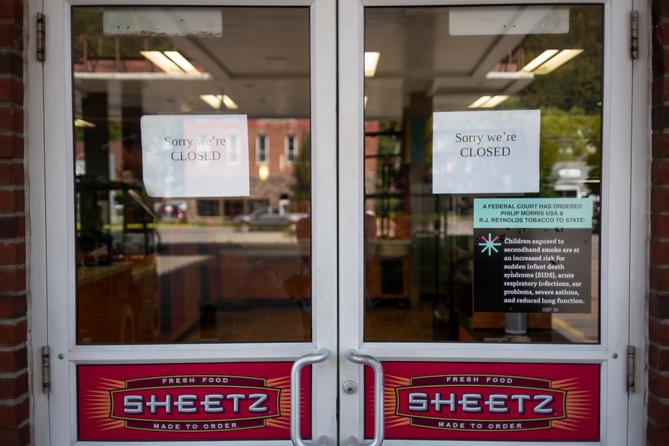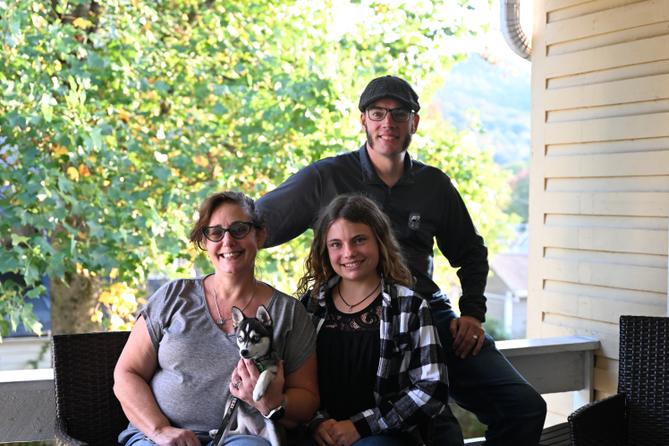EMPORIUM — In early August, Sheetz announced plans to shutter its only location in rural Cameron County, and the closure was all anyone could talk about.
The small north-central community in the heart of the Pennsylvania Wilds would lose the only 24/7 gas station for miles. Residents, who’ve watched industries come and go over the years, thought this was just the latest economic blow. Meanwhile, local leaders tried to sway the company into staying by proposing other properties. They worried the gap would damage traffic and tourism throughout the region, which is known for its outdoor recreation and dark skies.
But those concerns quickly fizzled out.
In downtown Emporium, a cafe extended its hours. An ice cream shop expanded its menu. A nearby gas station shifted to 24-hour operations. And — thanks to recruitment efforts made by elected officials — Nittany MinitMart, a convenience store and fuel chain, is moving to the area.
So when Sheetz closed late last month, the loss wasn’t as consequential as some had feared. A spokesperson declined to comment on why the brand closed its location. Locals said it was likely due to an inability to expand the storefront, which was wedged between an outdoor trail and a post office.
Still, news of the closure was understandably triggering, Cameron County Commissioner Jessica Herzing told Spotlight PA.
“We’re coming out of a decade of watching things close and buildings get torn down. It’s hard to live in a community where you’re watching closures happen,” she said. “People are getting displaced from their jobs, and then, you have to physically watch your town get destroyed through the razing of storefronts to create empty spaces.”
Cameron County — the state’s least populous, with roughly 4,500 residents — has lost businesses and people over the past few decades. Those departures have in kind affected the tax money needed to provide services for those still left.
In recent years, there’s been a push for revitalization.
“We are very good at reinventing ourselves,” Commissioner James Moate told Spotlight PA.
Storefronts that were empty years ago are now occupied by young entrepreneurs who want a thriving main street and vibrant community. And while conversations about economic development were happening before the loss of Sheetz, the closure prompted the county’s three commissioners, the chamber of commerce, and borough officials to be more strategic.

“With the Sheetz closure, it was great to see the chamber come on board with the borough, our office, and our economic development coordinator come and approach it from the different angles that speak to how we can best help and do it in a way that was very open,” Herzing said.
In a matter of days, elected leaders were discussing solutions and working with the business community. Weeks later, officials were in talks with a new vendor about relocating to the area.
“We’re all taking our pieces of what we can do best to fill that void and move forward,” Herzing said, adding that the loss sparked a similar collaborative approach to fill empty industrial space.
Jared and Cici Brackbill weren’t surprised to see local businesses step up. They moved to Emporium with their daughter, Essy, after participating in a one-month remote work program last year. Part of the appeal for the family was the close-knit community, they told Spotlight PA.
“In a big town, you look at somebody else to do it, right? ‘Somebody else will take care of that. Somebody else will do that,’” Cici Brackbill said. “But here, in this small town, there is no ‘somebody else.’ There’s us, and we’re going to fix it.”
Cameron County once boomed with big industries such as lumber, dynamite, and powdered metals. But over the past decade, many shuttered operations.
In 2021, American Axle bought a plant formerly used by GKN Sinter Metals and was the county’s biggest employer, employing hundreds throughout the region. However, it closed the facility the following year.
Despite that setback, leaders are still trying to bring new companies and manufacturers to the area.
Tina Johns Solak, executive director of the Cameron County Chamber of Commerce & Artisan Center, said incentivizing relocation is necessary for recruitment efforts. She told Spotlight PA that the chamber and county are workshopping solutions, such as covering some of the costs of repurposing existing facilities to fit specific needs or utility hookup fees.
The county’s biggest challenge — especially with regards to recruiting another manufacturer — is transportation, officials said. State Route 120, which connects Lock Haven in Clinton County to Ridgway in Elk County, is the main highway.
It’s also about an hour drive — or more depending on the direction and road conditions — from Emporium to Interstate 80.
“For us to get an industry here, we need to have a road system that is viable for expanded trucking, so we can get our products from our manufacturers out of here, so our residents can get where they need to go safely,” Herzing said.
Timothy Nebgen, a spokesperson for PennDOT, told Spotlight PA in an email that Cameron County’s terrain created challenges for development. Expanding the road would also come at a high cost. But bettering the road remains a priority for the department, he added.
While some leaders want to accommodate an industrial manufacturer in Cameron County, others see opportunities to bring more small businesses into the community.
Commissioner Josh Zucal, who also owns Aroma Cafe in Emporium with his wife, thinks the area would benefit from having a bait shop or outfitter, as more than 60% of the county’s land is publicly owned and rich with recreation opportunities.
Meanwhile, the Wilds Are Working program — the publicly funded initiative that the Brackbill family participated in — has demonstrated that it’s possible to work remotely and live in a rural area.
After hosting a group as part of the effort, however, local elected officials realized some of the community’s shortcomings — such as outdated or limited housing options — need to be addressed to attract more residents.
Solak said Cameron County needs more townhouse-based developments, and hopes smaller options and newer construction could appeal to people 55 and older, plus young professionals.
“But we have to be able to recruit the builder to come here and do it,” she said. “That is a stumbling block to economic development.”
State policymakers and local leaders have grappled with addressing rural population loss. Gaps in housing, health care, transportation, and jobs are deterrents to recruitment and retention in more remote areas, they’ve found.
The Center for Rural Pennsylvania, an agency overseen by the state legislature, released 30-year population projections last fall that forecast a 5.8% decline in rural counties. But after reviewing new data from the U.S. Census Bureau, the state’s experts said that the decline is happening more rapidly.
Essy Brackbill, 14, said she sees herself staying in Cameron County long-term. And while her parents love the idea of their daughter planting roots in their newfound home, they wonder about the future of rural communities.
“What are these towns going to be doing in five years, 10 years?” Jared Brackbill said. “What are the old factories going to be? What are the storefronts going to be?”

Since 2020, the Department of Community and Economic Development has awarded more than $3 million in grants to Cameron County, which has a $11.9 million budget for 2024.
The public funds included COVID-19 relief dollars, support for tourism and marketing, building upgrades, and staff training. Emporium Borough, which has a $1.2 million budget for the year, has received more than $700,000 for similar projects in the same period.
The commissioners credit Cliff Clark, the county’s economic development director, with making connections and looking for funding opportunities to support revitalization. Emporium Borough has also benefited from the years its manager Don Reed served as president of the Pennsylvania State Association of Boroughs.
Building personal relationships with state agencies is crucial, Reed told Spotlight PA.
“You’ve got to show them that not only do you have a good project, you’re willing to put some skin in the game, but the biggest thing is — once you do it and you become successful at it — it makes them look good,” he said. “The next time you submit an application, they’re going to go: ‘Well, these people follow through.’ And you build a reputation. That takes time, and it takes effort.”
The borough has no debt in part due to grants supporting improvement projects, Reed said.
However, the process of applying for grant money and making those connections is all-consuming, and many rural counties tend to have limited capacity for planners and grant writers.
This leaves many communities reliant on the state to guide rural development and decide what projects are worth prioritizing based on current administrations, Herzing said.
More support — such as money for more affordable but not low-income housing, transportation, site readiness — from the government could go a long way, local officials said.
The commissioners also suggested that the state think differently about how it defines rural — a classification largely set by the Center for Rural Pennsylvania — to prioritize funding for areas with smaller populations and not group them with rural places with more people, like Centre County.
“We still have a lot of work to do, but we’re going to keep pushing,” Moate said. “We’ll pass the ball to whoever wants it.”
SUPPORT THIS JOURNALISM and help us reinvigorate local news in north-central Pennsylvania at spotlightpa.org/donate/statecollege. Spotlight PA is funded by foundations and readers like you who are committed to accountability and public-service journalism that gets results.
